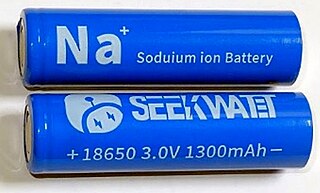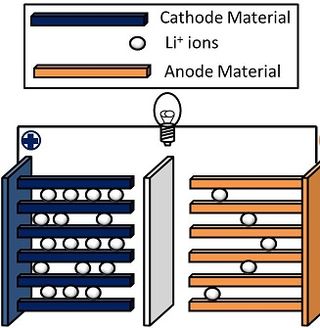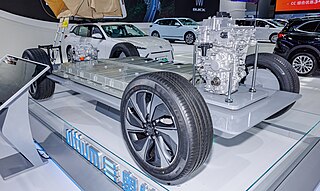Related Research Articles

A lithium-ion or Li-ion battery is a type of rechargeable battery that uses the reversible intercalation of Li+ ions into electronically conducting solids to store energy. In comparison with other commercial rechargeable batteries, Li-ion batteries are characterized by higher specific energy, higher energy density, higher energy efficiency, a longer cycle life, and a longer calendar life. Also noteworthy is a dramatic improvement in lithium-ion battery properties after their market introduction in 1991: over the following 30 years, their volumetric energy density increased threefold while their cost dropped tenfold.

The lithium iron phosphate battery or LFP battery is a type of lithium-ion battery using lithium iron phosphate as the cathode material, and a graphitic carbon electrode with a metallic backing as the anode. Because of their low cost, high safety, low toxicity, long cycle life and other factors, LFP batteries are finding a number of roles in vehicle use, utility-scale stationary applications, and backup power. LFP batteries are cobalt-free. As of September 2022, LFP type battery market share for EVs reached 31%, and of that, 68% were from EV makers Tesla and BYD alone. Chinese manufacturers currently hold a near monopoly of LFP battery type production. With patents having started to expire in 2022 and the increased demand for cheaper EV batteries, LFP type production is expected to rise further and surpass lithium nickel manganese cobalt oxides (NMC) type batteries in 2028.
LG Chem Ltd., often referred to as LG Chemical, is the largest Korean chemical company and is headquartered in Seoul, South Korea. It was the 9th largest chemical company in the world by sales in 2021. It was first established as the Lucky Chemical Industrial Corporation, which manufactured cosmetics. It is now solely a business-to-business company.

An electric vehicle battery is a rechargeable battery used to power the electric motors of a battery electric vehicle (BEV) or hybrid electric vehicle (HEV).
The lithium-titanate or lithium-titanium-oxide (LTO) battery is a type of rechargeable battery which has the advantage of being faster to charge than other lithium-ion batteries but the disadvantage is a much lower energy density.

A solid-state battery is an electrical battery that uses a solid electrolyte for ionic conductions between the electrodes, instead of the liquid or gel polymer electrolytes found in conventional batteries. Solid-state batteries theoretically offer much higher energy density than the typical lithium-ion or lithium polymer batteries.

Sodium-ion batteries (NIBs, SIBs, or Na-ion batteries) are several types of rechargeable batteries, which use sodium ions (Na+) as their charge carriers. In some cases, its working principle and cell construction are similar to those of lithium-ion battery (LIB) types, but it replaces lithium with sodium as the intercalating ion. Sodium belongs to the same group in the periodic table as lithium and thus has similar chemical properties. However, in some cases, such as aqueous batteries, SIBs can be quite different from LIBs.

SK Innovation Co., Ltd. is an intermediate holding company of SK Group engaged in petroleum, alternative energy, and oil exploration. It runs its business through eight major subsidiaries, including SK Energy, SK Geo Centric, SK On, SK Enmove, SK Incheon Petrochem, SK Trading International, SK IE Technology and SK Earthon.

Contemporary Amperex Technology Co., Limited (CATL) is a Chinese battery manufacturer and technology company founded in 2011 that specializes in the manufacturing of lithium-ion batteries for electric vehicles and energy storage systems, as well as battery management systems (BMS). The company is the biggest EV and energy storage battery manufacturer in the world, with a global market share of around 37% and 40% respectively in 2023. The company is headquartered in the city of Ningde in China's Fujian province.
Huayou Cobalt Co., Ltd primarily operates as a supplier of cobalt and its associated products, such as cobalt tetroxide, cobalt oxide, cobalt carbonate, cobalt hydroxide, cobalt oxalate, cobalt sulfate, and cobalt monoxide. The company is headquartered in the Tongxiang Economic Development Zone of Zhejiang, China.
Benchmark Mineral Intelligence also known as Benchmark Minerals, founded and owned by Simon Moores in 2014, is a London-based Price Reporting Agency (PRA) and specialist information provider for the lithium-ion battery to electric vehicle (EV) supply chain. The company had £11 million in assets as of 2022.
The lithium nickel cobalt aluminium oxides (abbreviated as Li-NCA, LNCA, or NCA) are a group of mixed metal oxides. Some of them are important due to their application in lithium ion batteries. NCAs are used as active material in the positive electrode (which is the cathode when the battery is discharged). NCAs are composed of the cations of the chemical elements lithium, nickel, cobalt and aluminium. The compounds of this class have a general formula LiNixCoyAlzO2 with x + y + z = 1. In case of the NCA comprising batteries currently available on the market, which are also used in electric cars and electric appliances, x ≈ 0.8, and the voltage of those batteries is between 3.6 V and 4.0 V, at a nominal voltage of 3.6 V or 3.7 V. A version of the oxides currently in use in 2019 is LiNi0.84Co0.12Al0.04O2.

Lithium nickel manganese cobalt oxides (abbreviated NMC, Li-NMC, LNMC, or NCM) are mixed metal oxides of lithium, nickel, manganese and cobalt with the general formula LiNixMnyCo1-x-yO2. These materials are commonly used in lithium-ion batteries for mobile devices and electric vehicles, acting as the positively charged cathode.
China produced more than 15 billion units of lithium-ion batteries in 2019, which accounts for 73% of the world's 316 gigawatt-hours capacity. China is a significant producer of lithium batteries and electric vehicles, supported by government policies. Lithium-ion batteries produced in China are primarily exported to Hong Kong, the United States, Germany, Korea, and Vietnam. The electric vehicle industry significantly drives the demand for lithium-ion batteries due to their high energy density relative to their weight. In the decade since 2008, the production of lithium batteries has tripled.

This is a history of the lithium-ion battery.

Ultium is an electric vehicle battery and motor architecture developed by General Motors. It is being deployed for battery electric vehicles from General Motors portfolio brands along with vehicles from Honda and Acura.
LG Energy Solution Ltd. is a battery company headquartered in Seoul, South Korea. LGES is one of the largest battery makers in the world alongside CATL, Panasonic, SK Innovation, and Samsung SDI.

POSCO Future M Co., Ltd., is a South Korean battery material & chemical company that produces materials for lithium-ion batteries(as known as Cathode, anodes), refractories and basic industrial materials.
The electric vehicle supply chain comprises the mining and refining of raw materials and the manufacturing processes that produce batteries and other components for electric vehicles.
Beijing WeLion New Energy Technology Co., Ltd., known simply as WeLion New Energy or WeLion, is a Chinese battery manufacturer specializing in semi-solid and solid state batteries for use in electric vehicles and energy storage systems. The company is headquartered in the Beijing's Fangshan District, and is a spinoff from the Labratory of Renewable Energy of the Institute of Physics of the Chinese Academy of Sciences. It is best known for supplying the world's first mass produced semi-solid state battery cells for an automotive traction battery application, in the form of Nio's 150 kWh swappable battery pack.
References
- 1 2 Li, Gloria; White, Edward; Buseong, Kang (2023-05-30). "The billionaire whose electrode empire powers China's EV dominance". Financial Times. Retrieved 2024-11-09.
- ↑ "Ronbay Technology | Briefing". Equal Ocean. Retrieved 2024-11-09.
- ↑ "Ningbo Ronbay New Energy Technology Co Ltd". Financial Times. Retrieved 2024-11-09.
- 1 2 "China's Ronbay Starts Building Battery Material Plant - World-Energy". www.world-energy.org. Retrieved 2024-11-09.
- ↑ "Ronbay Announces its Global Development Strategy to Implement a Project of 40,000-Ton-per-annum High-nickel Ternary Cathode and 20,000-Ton-per-annum Lithium Ferromanganese Phosphate in Korea". www.prnewswire.com (Press release). Retrieved 2024-11-09.
- ↑ Lockett, Hudson (2019-07-19). "'China's Nasdaq': Shanghai's new tech trading venue explained". Financial Times. Retrieved 2024-11-09.
- ↑ "Ronbay Technology and EVE Establish Strategic Partnership". www.energytrend.com. 2023-06-07. Retrieved 2024-11-09.
- ↑ Li, Gloria; Davies, Christian; White, Edward; Jung-a, Song (2023-08-22). "China's cathode billionaire targets US battery market via South Korea IPO". Financial Times. Retrieved 2024-11-09.
- ↑ "Chinese Firms Are Seeking Korean Partners to Skirt US EV Rules". Bloomberg. 2023-07-30. Retrieved 2024-11-09.
- ↑ "容百科技发布全球化战略规划:在中韩欧美全球多地布局生产基地". 经济观察网 (in Chinese). Retrieved 2024-11-09.
- ↑ "Ningbo Ronbay to enter cathode production in Europe with Polish factory". Benchmark Source. 2024-10-25. Retrieved 2024-11-09.
- ↑ Jae-hyuk, Park (2024-10-23). "LG Chem files patent suit against China's Ronbay". The Korea Times . Retrieved 2024-11-09.